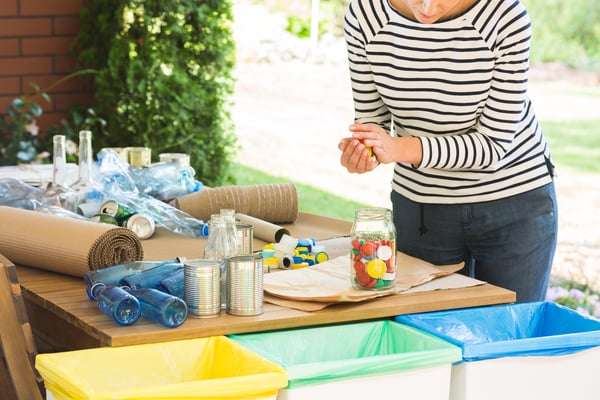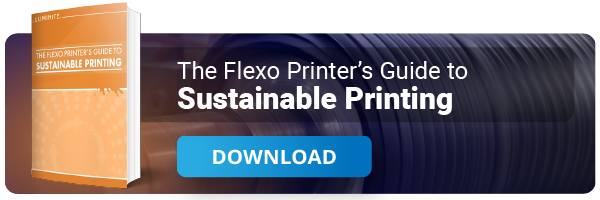Share this
Flexo Printing Sustainable Packaging Strategies: Beyond ‘Going Green’
by Luminite on Aug 27, 2020 4:25:29 PM

Nowadays there’s a lot of conversation around “going green.” Like many other industries, flexo printing is transitioning toward a more environmentally friendly future.
What began with green packaging has become a more comprehensive effort toward sustainable flexo that will provide long-term environmental benefits at all stages in the printing process.
Keep reading to learn more about sustainable packaging strategies for flexo printing -- and how “going green” is no longer enough.
The Difference Between Going Green and a Sustainable Packaging Strategy
Going green and being sustainable aren’t mutually exclusive endeavors; in fact, they largely complement one another. Think of going green as one step in an overall sustainability effort. They each approach eco-friendliness from a different perspective.
Going green begins with end-of-use environmental friendliness in mind, and it tends to focus on immediate steps for promoting eco-friendly habits.
For example, the classic going green strategy is “reduce, reuse, recycle.”
Reduce what’s used, reuse existing products if possible, and recycle those that can’t be reused. While these are effective habits for decreasing environmental impact, they’re vanilla. Everyone does them.
Companies might tout their triple-R efforts but, real sustainability starts with awareness and design. Going green is the last stage in an overall sustainability strategy.
Steps for a Sustainable Packaging Strategy
Developing a comprehensive sustainability practice can be daunting -- there’s so much to consider! Start with the basics:
- Developing an awareness of sustainability concerns/opportunities
- Sustainable packaging design
- Green sustainable packaging materials
- Product end-of-life
It’s OK if you don’t think of every little detail right out of the gate. Many sustainable packaging strategies are revisited, added to, and adjusted to suit new goals over time.
Thinking About Sustainable Flexo
The first step to fixing a problem is to recognize there is one, right?
Take a look at your company’s carbon footprint. How much waste are you putting out? Where do your products end up after customers are done with them? Are there more sustainable practices you could be using?
Then, make a SMART goal (specific, measurable, achievable, realistic, time-bound). An example would be decreasing your company’s waste from flexo printing operations by 40% in 3 years. You’re more likely to follow through on that target instead of simply saying, “Let’s be more eco-friendly.”
The transition to sustainability requires awareness and knowledge. Through this flexo printing course on sustainability, businesses can learn all the ways sustainability can ultimately be infused into printing processes.
Sustainable Packaging Design
When designing a product, the customer’s needs are forefront in your mind, right? Why not slip in the environment in there too? All great sustainability packaging strategies start as an idea and grow from there.
Think about the processes needed to make your product. Are they wasteful? Is there a process that’s less wasteful but still meets the same end goal?
What’s the end-use of the product? Will it go to a landfill or be recycled? Can customers use it around the house?
Most Sustainable Packaging Materials
Obviously, materials are a big part of the sustainability movement. Most customers want biodegradable and reusable packaging, so the industry is forced to deliver.
Today the industry offers a variety of sustainable product packaging solutions, including sustainable materials for food packaging.
Some of the most sustainable packaging materials today are the same ones you’ve heard about for years:
- Sustainable paper/paperboard
- Recycled corrugated cardboard
- Biodegradable plastics
Many plastics are now recyclable at drop-off recycling locations. PVC (#3) and PS (#6) are usually the top plastics on any list of sustainable packaging materials.
But let’s not forget about the inks and adhesives. Those are just as important for maintaining sustainability goals.
Product End-of-Life
Technically, when your product rolls off the lot, it’s not your problem anymore. You’re done with it. Sayonara. Adiós.
Wrong. Your flexible packaging is just as important when it’s out on the market as when it’s on the presses. Think about how much product you make. Got a number? Now, think about all of that in a landfill somewhere.
Not a pretty sight, huh?
Remember the quintessential “green” tactic from earlier -- reduce, reuse, recycle? Well, your product should reduce landfill waste, be reusable, and consist of recycled materials that can be recycled again.
Many companies recollect their packaging after it’s been used so they can clean it and put it to use again.
Making the Change to Eco-Friendly Flexo Printing Strategies
Eco-friendly flexo printing requires asking big questions. Will the packaging perform as necessary while incorporating sustainable materials? What sustainable methods should be in place to ensure that the pressroom environment is up to code?
There’s certainly a lot to consider when growing from “green” to sustainable. Whether it’s switching up inks to decrease VOCs or changing your image carrier to decrease waste, working with a flexo print supplier can help you identify your needs and meet your goals.
Want to learn more about sustainable flexo printing? Check out our free guide!
Share this
- Flexographic Printing (81)
- Image Carrier (28)
- Elastomer sleeves (27)
- Ink Transfer (25)
- Quality (22)
- Flexo sleeve (20)
- News (18)
- printing defects (18)
- flexo printing defects (17)
- sustainability (13)
- Flexo Troubleshooting (12)
- Ink (12)
- Digital Printing (10)
- Flexo 101 (10)
- Flexo Inks, (9)
- Anilox (7)
- Blister Packaging (7)
- Cost (6)
- print misregistration (6)
- regulations (6)
- Corrugated Printing (4)
- pinholing (4)
- "Tradeshow (3)
- Digital Flexo (3)
- Gravure Printing (3)
- Insider (3)
- Load-N-Lok (3)
- Wide Web (3)
- direct laser engraving (3)
- flexo-equipment-accessories (3)
- gear marks (3)
- halo (3)
- testing (3)
- Narrow Web (2)
- bridging (2)
- feathering (2)
- filling in (2)
- mottled image (2)
- pressure (2)
- Labelexpo (1)
- dirty prints (1)
- doughnuts (1)
- embossing (1)
- kiss impression (1)
- October 2023 (2)
- September 2023 (1)
- August 2023 (1)
- July 2023 (3)
- June 2023 (1)
- May 2023 (5)
- April 2023 (1)
- March 2023 (2)
- February 2023 (1)
- January 2023 (3)
- December 2022 (1)
- October 2022 (3)
- September 2022 (2)
- August 2022 (2)
- July 2022 (3)
- May 2022 (1)
- April 2022 (4)
- March 2022 (2)
- February 2022 (5)
- January 2022 (7)
- December 2021 (1)
- November 2021 (3)
- October 2021 (2)
- September 2021 (1)
- August 2021 (1)
- July 2021 (3)
- June 2021 (1)
- May 2021 (4)
- April 2021 (4)
- March 2021 (4)
- February 2021 (2)
- December 2020 (1)
- November 2020 (1)
- October 2020 (2)
- September 2020 (1)
- August 2020 (3)
- July 2020 (2)
- June 2020 (3)
- May 2020 (1)
- April 2020 (1)
- November 2019 (3)
- October 2019 (1)
- August 2019 (1)
- July 2019 (1)
- April 2019 (1)
- March 2019 (1)
- January 2019 (1)
- October 2018 (2)
- August 2018 (1)
- July 2018 (1)
- June 2018 (1)
- February 2018 (2)
- October 2017 (1)
- September 2017 (2)
- January 2016 (1)
- February 2015 (1)
- January 2015 (1)
- December 2014 (2)
- September 2014 (1)
- February 2014 (1)
- January 2014 (1)
- December 2013 (3)
- October 2013 (1)
- September 2013 (1)
- June 2013 (1)
- January 2013 (1)


Comments (1)